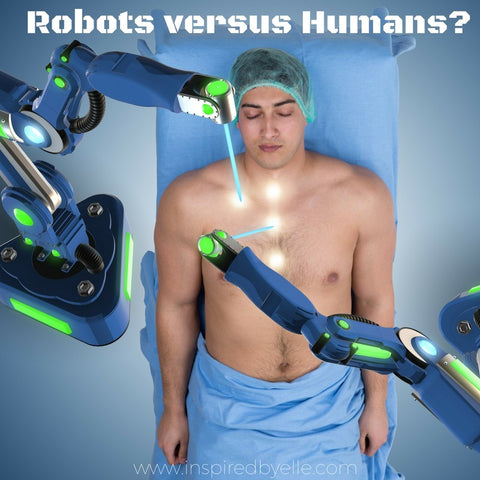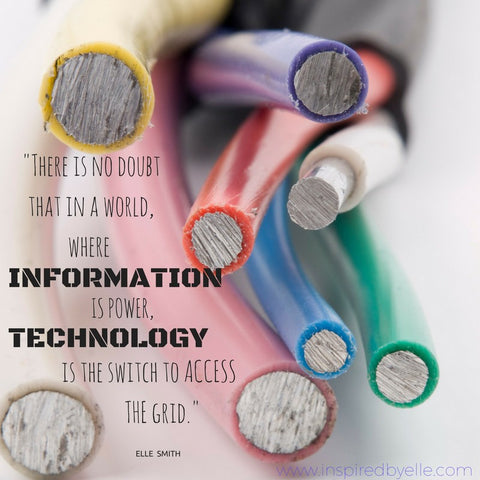Robots versus Humans - Who will seize Victory?
Robots vs Humans - Who Will Seize Victory?

It might surprise you to learn that Blade Runner, the iconic 1982 science-fiction film, is set in the dystopian Los Angeles of 2019. That's only two years from the date this article was written!
Blade Runner is based on the Philip K. Dick novel, 'Do Androids Dream of Electric Sheep?' It tells of a world where some robots have evolved to develop an almost Frankensteinian antipathy towards their creators. The protagonist, Rick Deckard, is a Blade Runner, hired to track down these rogue robots, referred to in the film as replicants. The new Bladerunner 2049 promises to be equally enlightening as to the fate of humanity.
Advances in artificial intelligence, AI for short, make the news almost daily. It's an ironic reality that we’re a little too busy in our own working lives to pay much attention to their insidious development. And yet it is commonly recognised that robots will transform the business landscape and remove many of the jobs we currently perform.
It’s enough to worry about finding gainful employment in the rising world of robots, but at least if we’re jobless it’s only the money we have to worry about. Visualise a world where robots have acquired a Blade Runner notoriety and need to be hunted down to prevent them harming society. This is creative art becoming reality. What if robots adopted psychopathic impulses and turned against humans, killing them in droves? Could we survive a war against AI? What are the risks and are they insurable? Or would we each need to hire our own Rick Deckard to keep us and our families safe?
It may seem like a robot rebellion is a bit farfetched at this moment in time, if you gauge the current technology. Still, while the walking, talking 'tin head' is still a long way off, there are many uses of robotic technology in place today. Two examples are driverless cars and prosthetic limbs. While the former threatens to take millions of jobs from the market, you could argue the latter promises to return amputees to the jobs market. But could either machine kill or injure humans? What is the perceived risk and where do the liabilities lie?
Driverless Cars
It’s not only Google who have been testing driverless or self-driving cars recently. Most of the big car manufacturers, including Ford and BMW, have unleashed their prototypes on the roads as well.
Of course cars have a long history of killing people, usually through driver error, though bad weather can do its bit too. There has been a whole automotive creativity assigned to making cars safe. The introduction of seat belts, airbags and automatic braking systems have increased accident survival rates. Drivers, their passengers, as well as pedestrians and cyclists, are all being killed in far fewer quantities.
Today’s scientists want to chamois the slate clean on road safety in the name of advancing robotics technology. They want to take the driver out of the equation. But they seem to forget that the algorithms needed for a driverless car to navigate a roads network are impossibly complex. It’s not only about switching lanes and stopping at red lights. Collision avoidance, particularly involving random pedestrians, requires fine-tuned ‘human’ thinking. This may be impossible to program into even a supercomputer.
After an accident, who’s responsible? Who’s liable for the millions of pounds of compensation paid out after a fatality? Is it the driver-passenger? Or the car manufacturer? Or the designers of the laser and camera technology used to detect obstacles? Is it the pedestrian who stepped out into the middle of the road? The risks are compounded by the knowledge there is always the chance that terrorists could hack into the AI and weaponise the vehicle.
One has to wonder whether the government is paving the way with the removal of personal injury compensation completely. Arguably, this poses a greater risk to the manufacturers than simple malfunction of artificial intelligence or a robot. Not only that we have seen Volkswagen facing massive compensation over emissions. However, just imagine the impact of a class of claimants where injury had been caused by this technology.
SMART technology and Prosthetic Limbs
Today’s prosthetic limbs have come a long way from the simple wooden leg. Arms too can be replaced, restoring the ability of performing many simple daily activities to amputees. Prosthetic technology has become almost an art form.
The first ‘bionic’ arms were operated by twitching existing muscles left in the stump. However this restricted the movements available. Today’s prosthetics use skin sensors to pick up nerve movements. A small computer fitted in the prosthesis decodes these nerve movements and ‘tells’ the arm to move appropriately. The range of movements is vastly extended and the user becomes less likely to discard his limb.
The major drawback with these state-of-the-art robotic limbs is that not only do they contain a computer, but need Wi-Fi access. This means that they theoretically could be hacked. This in turn opens up a whole new slew of plot lines for crime and sci-fi writers. Imagine if someone hacked into someone’s prosthetic arm and caused it to strangle the wearer; even stab to death a third party? Again, who’s responsible for the murder? The hacker? The wearer? The prosthetic manufacturer? All may have varying degrees of liability.
Equally, in all criminal acts, they operate a duality which not only includes the actus reus, which poses a problem with artificial intelligence as to the mens rea, or guilty mind. This may pose some very real challenges for our legal practitioners as although the physical element would likely be evident, the same may not apply to the mental component. Perhaps the most poignant issue in this matter, it that robots and AI is already deeply integrated into our lives. Yet, no conversation has taken place as to the ethics or legal issues around this technology.
A huge can of worms could essentially be opened up, as regards the valuation of human life in comparison to transhuman beings. This may sound far-fetched but how much automation to human form constitutes a human being? Would we be playing on a level-playing field in terms of equality, if say some human beings had artificially enhanced IQ? Even in sport, this may arise soon as to whether competitions are imbalanced, if another party has some form of enhancement?
We are all living in an age of SMART technology, where the Internet of Things allows for remote control of devices. However, one day this could be us!

Consider the pharmaceutical industry which has seen phenomenal growth in recent years, but are we really more sick, or has this been effectively a managed marketing campaign to get us acclimatised to taking prescription drugs. One device released recently promising to revolutionise the management of diabetes, was the Freestyle Libre by Abbott. This device works with a sensor inserted externally into the body; however it is not too imaginative to expect this device to develop to a controlled-management system where fluctuations in glucose levels are managed with medication. It is highly likely that we will see automation of many medical functions in the years to come, which does make humans vulnerable to the machine.
If this seems an insane concept, consider that doctors switched off the Wi-Fi capability of Dick Cheney’s pacemaker. This meant that they couldn’t monitor his heart function remotely. But more importantly it meant that hackers couldn’t assassinate the then U.S. Vice President either.
Even if there’s no criminal intent behind an injury caused by a prosthetic limb, there still needs to be some transparency as to who is liable.
A Technology Coup
This title is not meant to be alarmist, rather a reality check on how dependent we all are on technology in the 21st century. 'Information is power' and whoever holds the keys to that information is really the person (persons or business) in charge of our lives and destiny.

Whilst this may be strange to imagine, but wars are being fought and won within the media and information dispersement industries. Maybe this is another area where humans need to be monitoring and challenging the huge monopolies which have developed around them.
Well, what is a 'coup' firstly, essentially it is a takeover of power or achieving something difficult. Perhaps both points are significant factors. Robots and AI certainly have access to our many systems already. Google works with complex algorithms to determine what you want to see when you search, or even possibly what you are allowed to see in search. Priority is given to certain websites over others; however no one actually knows how this is determined. Arguably, human influence may already be involved in these processes to gain control, potentially in prioritising certain business or even political interests. This algorothmic power could mean search is indeed a powerful tool in all aspects of human existence, from politics to equality. Could the AI which controls this determination, one day seek to influence for their own interests?
Protection For People, Not Robots
The behind-the-scenes advances in robotics technology should be of concern to everyone. Scientists locked away in labs are installing computers in heavy steel objects, which have the capacity to kill or maim people. The prime concern is no longer about keeping a job; it's about keeping alive. There must be more consultation between the public and scientists before robots cause fatalities.
Of course intellectual property rights must be protected. However, there should be milestones in development, each of which is followed by public discussion of the risks. The man and woman in the street needs to get more involved before those streets are overrun with killer robots. Driverless cars and prosthetic limbs are only the start of a massive drive in creating AI machines, which one day may be able to self-replicate. This would mean that robots will no longer need any kind of human intervention at all, a disturbing prospect.
Many believe that programming emotional intelligence or self-doubt into robots should be mandatory. Unfortunately this requires the will of politicians to regulate and pass statutes. Sadly, regardless who is in power, politicians don’t have a good track record for placing obstacles in the path of big business. It is no longer the case that one day robotics technology will become big business, that day is today, make no mistake. In the UK, personal injury claims are already under the threat of reform. Changes like the recent passage of the Brexit-inspired Great Repeal Bill, may spell the demise and ultimate removal of human rights legislation.
If that's true, you can bet robot will not have their rights eroded. Victory for the tinheads may already be secured.
References
Blade Runner - IMDB
driverless car, by Margaret Rouse, updated Sept 2011
The dangers of self-driving cars, by Ilja Shatilin, Sept 5, 2016
The Prosthetic DEKA Arm Is Hackable and a Legal Mess, by Julia Alexander, June 3, 2014
World's first prosthetic arm which is controlled by THOUGHT via the spinal cord is developed by British scientists, by Colin Fernandez, Feb 6, 2017
Dick Cheney Feared Assassination Via Medical Device Hacking: 'I Was Aware of the Danger', by Dan Kloeffler and Alexis Shaw, Oct 19, 2013
Leave a comment
Comments will be approved before showing up.


